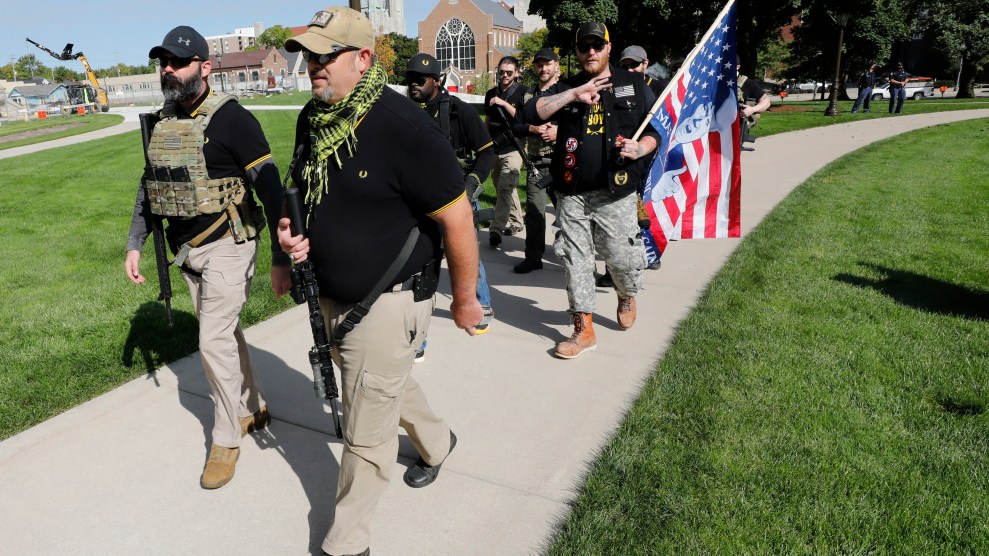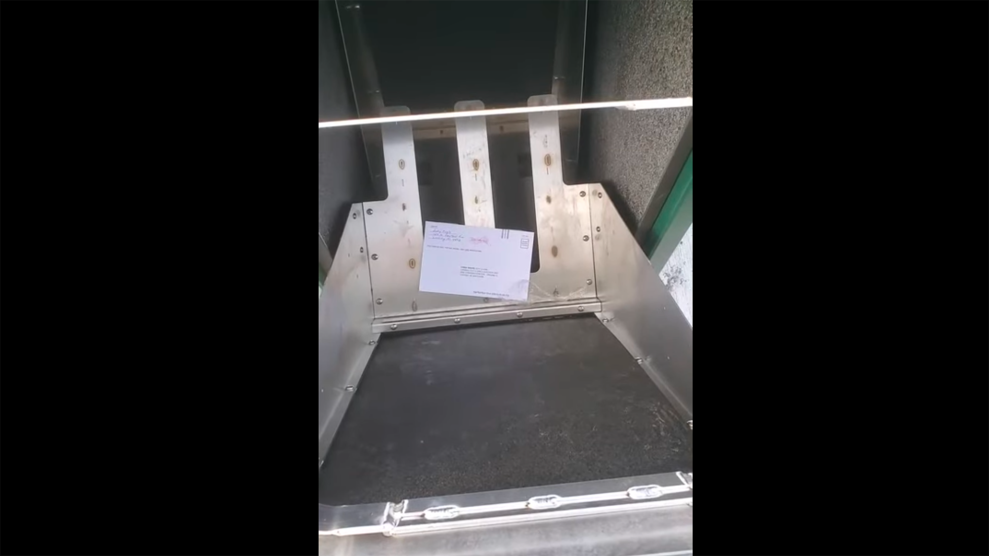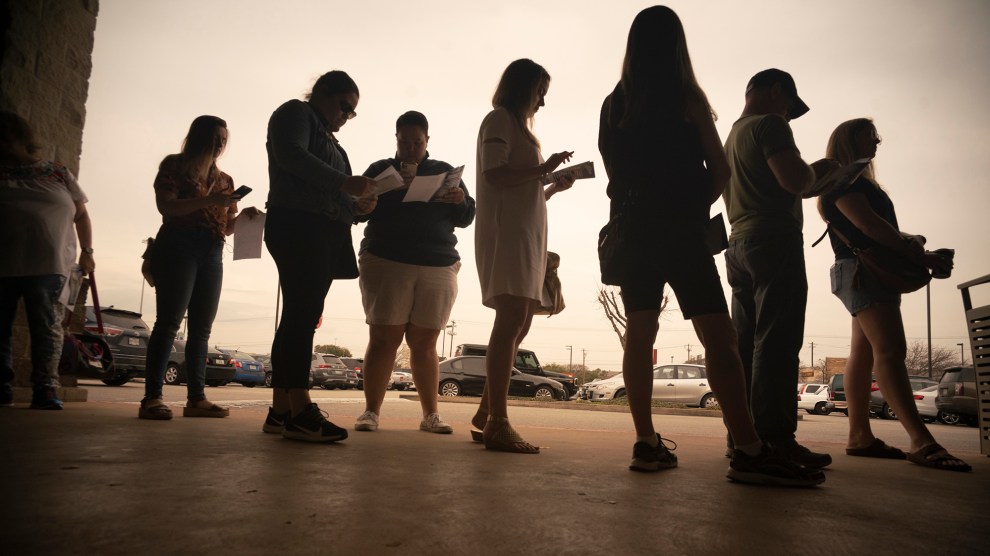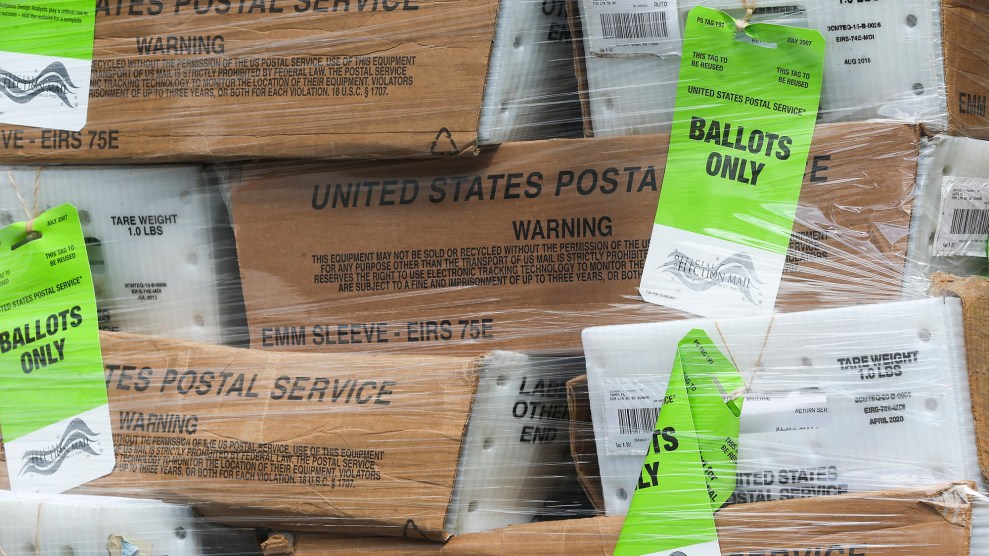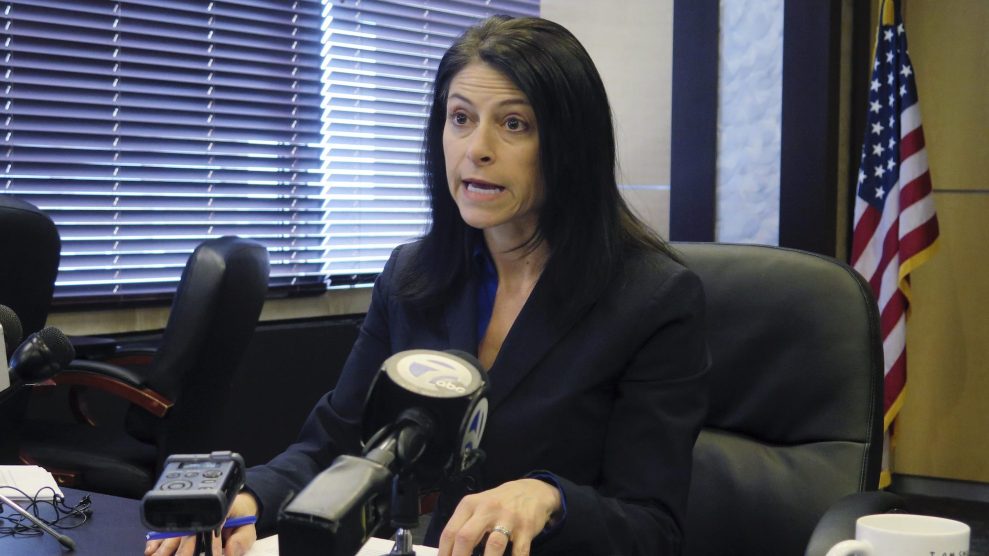
Michigan Attorney General Dana Nessel.David Eggert/AP
On October 1, Michigan’s attorney general’s office announced four felony charges against Jacob Wohl and Jack Burkman, two right wing conservative operatives known for flamboyant and often legally dubious schemes to drum up support for conservative causes and spread misinformation. Wohl and Burkman’s charges relate to an alleged plot to manipulate voters through a vast robocall scam. The calls reached nearly 100,000 urban residents across at least five states, and claimed that information from early voting ballots could be used by law enforcement and credit card companies to chase down outstanding warrants and debt. The calls also said that the CDC would weaponize similar information for a regime of forced vaccines.
The charges, Attorney General Dana Nessel says, are aimed at sending a message: Don’t mess with Michigan. “I hope that in prosecuting Wohl and Burkman, that this point has been made to people in state and out of state,” she told me in an interview this week. “I’m willing to do anything and everything I have to to protect the vote.”
This year, Nessel and other state officials working to ensure a smooth presidential election face unprecedented obstacles. To avoid exposure to COVID-19, many voters have turned to absentee voting over in person voting, an unprecedented shift for most states’ election infrastructures. Alternative forms of voting have become deeply politicized, with Republican-run state legislatures withholding badly-needed resources that could help election systems operate effectively. Meanwhile, the president is fueling the flames with conspiracy, with help from local allies. On Wednesday, the office of the Michigan secretary of state asked Nessel to open an investigation into the state Republican Party for promoting a pair of misleading videos asserting that ballot drop boxes were vulnerable to manipulation, asserting they were “irresponsibly spreading misinformation likely intended to suppress voting.”
“If the president sends the army out in order to intimidate people in the polls, then we’ll have an army of attorneys to fight back as quickly and aggressively as possible,” Nessel told me. “Will we have imagined every possible scenario there is? You just can’t, but we try.”
When we spoke earlier this week, she was understandably mum about the still-forthcoming Thursday announcement of state and federal charges targeting 13 men in conjunction with a plot to kidnap Gretchen Whitmer, Michigan’s democratic governor, and launch a coup. But in covering a wide array of threats to the election that she and her office are working to keep from becoming reality, she made sure to mention the threat that the state’s substantial armed militia presence could pose to voters.
What types of voter suppression tactics are you most concerned about?
The one that I’m most concerned about really involves misinformation and disinformation that’s promulgated by a number of different sources. The point of it is to confuse voters, or make voters think that their vote is not really going to count, or that the tabulations will not be accurate. So there’s no point in voting because your votes won’t properly be reflected in the outcome.
More than anything, our office is trying to combat misinformation with accurate information. This is particularly important this year because in 2018, in Michigan, the voters passed a ballot proposal that allowed for no-reason absentee voting. It turned out to be sort of prophetic because who knew that we were going to have a global pandemic the next election?
It’s great that we have no reason absentee voting, but because most people have never done it before, they don’t know how. Then add a litany of lawsuits that sort of change the rules every other day. So it’s hard to properly communicate what the rules are. It’s easy for people to get confused by misinformation, sometimes even from well-intentioned sources trying to give people information, but they don’t know what court ruling just came out maybe two days prior. It’s been a challenge. It ties in neatly with the charges that we issued last week against Jacob Wohl and Jack Burkman because their effort, obviously, was to suppress the vote. Since so many people have never voted absentee, and they don’t know what it entails, this might be some of the first information that they have and it’s woefully inaccurate.
What are some options to deal with that challenge?
We have an entire website that’s devoted to claims of misinformation at Michigan.gov so that we can combat it. Part of my job is to be out there and very forceful in terms of aggressively enforcing voter suppression laws. It’s not just a matter of us having formed these relationships now with social media platforms—like Google, or Facebook, or Twitter, YouTube—so that they can either take those statements down immediately or flag them. It’s one thing to have these anonymous groups out there that are promulgating these lies, but we have to deal with the president and other publics officials who in previous years could be a trusted source of information. Now they’re out there telling people, “Vote twice.” I have to come behind him and say, “Oh my God, no, don’t vote twice! I’m going to have to prosecute you if you do that.” And also letting people know that if people do vote twice, that there are mechanisms in the system that will automatically catch that so that nobody will actually be able to have their vote counted twice.
Beyond what you’ve described, what are some other examples of voter suppression efforts you’ve seen that fall directly under the AG’s purview?
When you talk about voter suppression, a lot of it has to do with us combating litigation that we see mostly coming in—either directly from the Republican Party or from Republican representatives who try to make it more difficult for people to vote or for their votes to count.
We are also anticipating various scenarios that could occur, and then trying to be prepared for it by having a plan in place. We’re ready to get out there and take action as quickly as possible. The president has indicated he would send in federal law enforcement, which is illegal, that he’d have local sheriffs go out to the polls, which is illegal, inciting poll watchers or poll challengers to interfere in the election by intimidating or threatening voters, which is illegal.
We’re working very, very hard with state and local law enforcement to make sure we’re prepared for militia groups and armed gunmen, who go out and try to threaten voters to the polls. I don’t say this to scare people, but to help people feel more secure, to know that we’re on top of it. And we hope that this doesn’t really happen, but if it does, we’re gonna be ready to pounce on it immediately.
From your perspective what is the worst case scenario going into November 3?
I hate when I hear talk of somehow disloyal electors coming in and certifying the election in a way that would not reflect the popular vote. I don’t think that can happen in Michigan. We’ve looked at this issue over and over again. We have a Republican majority legislature and both our majority leader in the senate and our speaker are very, very loyal Trump supporters. However, we have a Democratic governor whose job is to certify the election, and we have a Democratic Secretary of State. I have great faith in both of them that, irrespective of who wins, that Michigan’s 16 electoral votes will go towards whoever got the most votes in the state of Michigan.
The President has also worked hard to push out this false narrative that you can’t trust absentee voting. We know that we have an incredibly low number of incidences of fraud when it comes to absentee ballots. And that’s why challenges to voting, whether it’s in our state or in states around the country, invariably always lose, because they don’t have any historical examples of voter fraud.
It seems a lot of his supporters will vote on Election Day, where most of Biden’s supporters will vote absentee. The concern is that Trump will suddenly declare victory the evening of the election when millions and millions of votes are outstanding, and they try to rush to the court in an effort to stop of the counting of the absentee ballots, which might all but guarantee a victory for him, when truly it could be another 500,000 to a million votes for Biden.
What’s in the tool belt of the AG’s office to confront these threats?
I think what people don’t necessarily know is that we have a litany of laws on the books as it pertains to voter suppression, voter intimidation, threats against voters, and I truly believe that the reason why Jack Burkman and Jacob Wohl were so willing to name themselves in their robocalls is because they’re not used to any enforcement of these laws, even though they’ve been on the books for many years. We have many laws that permit us to go after those bad actors that want to interfere with a person’s constitutional right to vote.
Is your job affected by the current makeup of William Barr’s Department of Justice? If, for some reason, the AG Office of Michigan needs reinforcements how much federal support can you count on?
Honestly, at this point, I’m not counting on the DOJ to be of any assistance at all. The US Attorney General has become nothing but a hatchet man and a lap dog for the president. You can’t expect people to have any confidence that the DOJ will actually involve real justice at all.
Michigan’s voting system is pretty decentralized and overseen at the municipal level. How would you prioritize multiple problems flaring up across multiple localities at once?
Have we imagined every possible scenario there is? You just can’t, but we try. We’re also meeting continually with social media platforms, which have created a porthole. As soon as we see misinformation that goes out, boom. We can send it to [the social media platform] right away and ask them to at least flag it, or hopefully to take it down. YouTube just said they’ll take it down and that they’d actually preserve [misinformation posts] for us for criminal prosecution in the event that it delves in criminal statutes. We’ve had some disappointments when it’s come to some of those social media platforms. In the past, maybe they’ve failed, but I hope that they’ve learned those lessons, and that they really are sincere and well-intentioned and wanting to assist us to ensure that we don’t have elections issues based on things that get put up that wrongly assert disinformation.
Is everyone sort of on the same page here?
I think so. I guess because I’m over the age of 25, there are social media platforms that I haven’t personally talked to. But the major ones, I will say.
Could you name them?
I personally haven’t talked to Snapchat, or TikTok. I think my office has talked to Instagram, Facebook. Reddit is one, right?
So at this point, the AG’s office has reached out to Facebook?
We’ve had actually a number of really productive conversations with them. I hope they’re sincere, because all of their talking points are fantastic. They’ve been very clear that they’re going to have this open line of communication. When we point out something that’s out there that involves voter suppression or voter intimidation or voter misinformation, that they’ll immediately take it down. And I hope that’s true.
The other thing we’re worried about is we know that Facebook is a tool that’s used to mobilize insurgents, right? So the last thing they want to see is a militia organization—and you might know we have a problem with militias in Michigan—and we don’t want to see it used as an organizing tool, where somebody can say, “Hey everybody grab your guns, let’s get down to the 26th precinct in Detroit and we’ll meet down there.” If that’s a way that’s utilized to convene in order to perform an illegal act, we want to be able to say, “Okay, somebody picked this up, they reported it. Facebook, do your thing and take it down.” They pledged to do that, they have said that in no uncertain terms, that they’re going to work with the state in order to do that. I hope their commitment is sincere.
We’re gonna continue through the election. People are voting now. This morning, [October 5] I spoke to our Secretary of State: 400,000 people in Michigan had already voted.
It sounds like the 2018 rule reform is working.
Another issue that’s been a big problem in Michigan is that while it was so great that we changed the law in 2018, unfortunately the Republican legislature has not been great in terms of allowing us to do early counting. The most we can do at this point is basically unseal the envelope. And that’s just the day before [Election Day]. Processing each ballot takes a certain amount of time, it’d be great if we could have started that process earlier, and at least stack them all up, if not outright count them, at least a few days before.
Our Secretary of State has gone to great lengths to recruit tens of thousands of new poll workers just for this purpose. She’s been saying publicly that she expects to be done no later than Friday after the election. A lot of this has to be communication on her part, on my part, and of other officials in our state, letting people know that just because we don’t have the results back on Tuesday evening, or Wednesday, or even Thursday, it’s not about the quickest possible and fastest possible count, it’s about the most accurate count. We’re a little afraid that somebody will go to court and say, “Stop counting the ballots.” We’re expecting over 5 million people to vote this election. It’s possible half of those votes can come through absentee ballot voting, and it’s going to take a while to count them.
This election has highlighted so many of our system’s vulnerabilities. Are there any structural changes that would resolve a lot of these problems?
Yeah, I think so. Allowing absentee ballots to be counted earlier, and have the counting process begin earlier—obviously not released to the public because we don’t want it to influence people’s voting—would help by allowing additional types of processing of ballots. Take them out of the envelope, straighten them up, ready to go. We also need to ensure we have the appropriate amount of poll workers.
We have to have laws in place that don’t allow for public officials to be making intentional misstatements for the purpose of disenfranchising the vote or undermining the integrity of our elections. Without free and fair elections that people can have confidence in, we don’t really have a democratic society. It’s so destructive to our society and our democracy. There’s no way to overstate that.
This interview has been edited for clarity and length.

